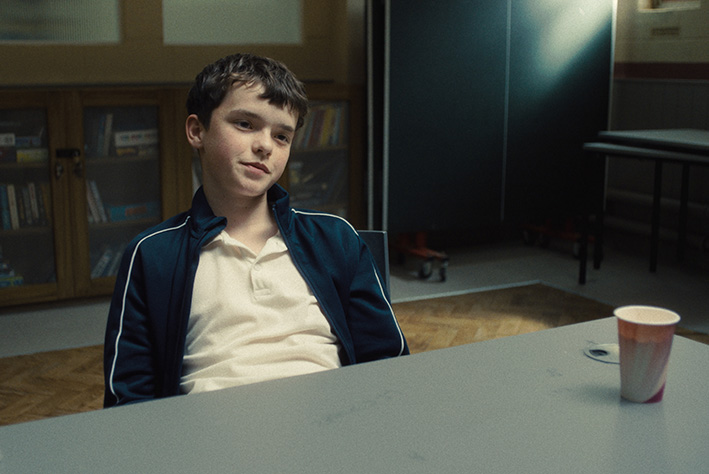Lessons from Adolescence: Think big and buy British

Opinion
The show proves that world-class content transcends borders and the British creative industries urgently need support and investment. Chris Bryant, please take note.
Adolescence is a British production that represents the best that we have to offer.
It deals with big themes, namely the corrosive nature of social media on young males, and it is stunningly scripted, directed, acted and shot. It is unashamed of presenting life in the raw, especially in the astonishing third episode.
And now it has become one of the biggest hits for Netflix worldwide; Sir Keir Starmer has even suggested that it be shown in schools.
Maybe it’s just me, but the softening of regulation of social media platforms and the critical and popular success of Adolescence are hard to reconcile.
Massive audiences around the world are showing that the harmful effects of social media on young people (not just male) are a huge, global concern.
Yet the government is having to bend to pressure from the platforms on regulation that aims to address the problems demonstrated so powerfully in Adolescence.
There is nothing new in the media holding governments to account, but this extraordinary situation does highlight in bold the importance of the media in tackling social matters in a way that the government now cannot.
People are rightly fearful of what social media is doing to society at the same time that the guardrails around social media are being loosened.
The concern being shown by people worldwide can and should counteract the undoubtedly conflicting difficulties of tech company pressures attached to tariffs, assuming that democracy still works.
Because the public knows that “freedom of speech” has its limits and they should fear the pressure being placed on the government to go soft on platform regulation.
Adolescence also reminds us of the sheer storytelling power of TV when it is well-made and dramatises events.
Last year’s Mr Bates vs The Post Office from ITV was a major hit that broke through the inertia that years of Private Eye investigations or documentaries and press couldn’t.
Adolescence is Mr Bates on steroids; it has exploded globally the issue of toxic masculinity and its relationship with social media in a way that nothing else did.
Snoddy: Post Office drama shows real scandals must be pursued to the bitter end
Public debate
So what does the success of Adolescence tell us about the health of the UK’s creative, media and advertising industries?
It proves that we can make world-class content that transcends borders, deals with big themes and prises open public debate.
And it shows that harnessing great creativity pays off. Netflix took a chance on some hugely talented people confronting an important issue. They thought big, backed themselves and the results are spectacular.
Both Adolescence and Mr Bates prove that the media really matters, that “collective” media can move mountains quickly and that politicians have to listen to the public and respond to their reactions.
Mr Bates pre-dated the new Donald Trump regime and the bandwagon-jumping by politicians after it was shown was at once hilarious and alarming. It showed how flat-footed governments are but how influential great media content can be.
That said, the fact that Adolescence is on Netflix is a conflicting matter for the UK.
The big streamers’ hybrid subscription/advertising model and global presence give them the upper hand in funding such programmes and turning them into international success stories.
We should be grateful that Netflix took the risk of making Adolescence and investing in British talent, even though it’s not a UK corporation.
It provides massive, engaged audiences that elevate the global debate over a hugely important subject that resists the excessive power of the platforms and brings much-needed money into the UK creative sector.
However, the streamers have greatly inflated the cost of talent and production for the whole industry. It is great that worldwide successes like Baby Reindeer are showcases for British talent, but the bigger they get, the more they drive up costs for UK TV companies.
The recent BBC series Wolf Hall: The Mirror and the Light only got made when the production crew agreed to be paid less. Other great shows are awaiting funding.
Co-productions help, with the streamers picking up the international rights, but they are becoming rarer.
Invest in British
Adolescence shows that it is possible for us to have our cake and eat it. We know that we are brilliant at creating things and we have a plural media industry that is good at distributing them.
So British advertisers should invest more in British content of all kinds and in British media. This means supporting British arts, cultural institutions and positive causes, helping to put the “A” back in STEAM — something that Sir Chris Bryant discussed at February’s LEAD conference.
They should prioritise investment in British media channels — our great TV, radio, online and physical properties that inform and educate the public but, crucially, are also demonstrably great at building brands and businesses while contributing strongly to the Exchequer, alleviating the tax burden.
British advertisers and British agencies should spend with British adtech players, support British retail media networks and other domestic brand- and business-builders.
Meanwhile, Adolescence also shows that great TV content still has the power to be hugely effective rapidly. So how come advertisers aren’t getting that message, seemingly fixated by fishing with rods, not nets?
We need more programmes like Mr Bates and Adolescence to be made by UK TV companies for viewers and advertisers, so they need to be supported. Our domestic TV companies don’t have the luxury of a subscription-based revenue model or the same level of global monetisation, so they need every penny they can get.
Because we can’t assume that Netflix will continue to take chances on such edgy programming, so we need our domestic TV companies to carry the flag.
And we need advertisers to ensure people like Danny Cohen get the funding they need to keep their ideas going and not lose them to the US and elsewhere because that’s where the money is.
Industries in peril
At LEAD, Bryant waved the flag for the British advertising industry and restated its economic and cultural importance.
But he didn’t encourage British advertisers, agencies and their commercial partners to support the British creative industries, including British media.
Bryant didn’t point out that our world-leading status in acting, music, directing, production, staging, lighting, scenery, gaming, technology, special effects and every other aspect of content creation, and in advertising and media, is in peril.
There was nothing in his speech about the government’s plans to support the creative services industry with its national AI strategy.
Bryant also didn’t mention that British media owners are being slowly strangled by advertising revenue declines as the vast majority of UK adspend is now being spent with non-British companies, including some of LEAD’s sponsors.
The corporations hoovering up the ad revenue do employ tax-paying people in the UK, of course, but profits are recognised elsewhere and careful corporate tax planning means that they deliver little to the Exchequer.
Bryant has a big portfolio and obviously his office had no time to reply to my email, but if they did I would encourage him to appear at next year’s LEAD and address the points here.
I would ask him to exhort the audience to think big, buy big and buy British.
We have a wonderful creative services industry, a brilliant advertising sector, some great adtech companies and a media industry that is among the world’s best.
However, it won’t stay that way unless action is taken by advertisers in the absence of government help.
Perhaps Bryant could start with tax incentives for advertisers investing in British businesses. This may reduce the tax take in the short term, but if British businesses can employ more people and pay more corporation tax, there will be a net gain.
Then perhaps we’ll get more Adolescences from domestic media owners, raising awareness of some major issues and giving the UK government public support that helps it resist interference in our affairs while adding to the tax take.
It would also be nice if next year’s LEAD conference were sponsored by British businesses that provide a user-friendly, brand-friendly, high-quality environment and which play an important role in fomenting and funding the British creative services industry, culture and society.
 Nick Manning is the co-founder of Manning Gottlieb Media (now MG OMD) and was chief strategy officer at Ebiquity for over a decade. He now owns a mentoring business, Encyclomedia, offering strategic advice to companies in the media and advertising industry, and is non-executive chair of Media Marketing Compliance. He writes for The Media Leader each month.
Nick Manning is the co-founder of Manning Gottlieb Media (now MG OMD) and was chief strategy officer at Ebiquity for over a decade. He now owns a mentoring business, Encyclomedia, offering strategic advice to companies in the media and advertising industry, and is non-executive chair of Media Marketing Compliance. He writes for The Media Leader each month.




